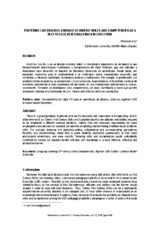Fostering LMD english language learners’ skills and competencies as a way to face new challenges in education
Autor
Kies, Mohamed
Editor
Universidad de Córdoba, UCOPressFecha
2016Materia
Language learning21st century skills
Competencies
Algerian LMD System (License Master Doctorate)
Competencias del siglo XXI para el aprendizaje de idiomas
Sistemas argelinos LMD (License Master Doctorate)
METS:
Mostrar el registro METSPREMIS:
Mostrar el registro PREMISMetadatos
Mostrar el registro completo del ítemResumen
There is a growing debate at present time on the necessity and importance of incorporating what is
often referred to as Twenty First Century Skills and Competencies that are attitudes and abilities required
to be developed in different learning situations. Indeed, they are necessary requirements for future
employability and are seen as essential components completing and reinforcing traditional basic academic
skills. For example, planning and objectives-setting, collaborating and communicating, persistence,
flexibility and initiative-taking, would help to make students successful academically, in their future
professional orientations, and even socially. Fostering skills and competencies would undoubtedly
contribute to making our students handle and deal with knowledge in a more effective, reflective and
productive manner. Asistimos hoy día a un un debate creciente sobre la necesidad e importancia de incorporar lo que
frecuentemente denominamos Habilidades y Competencias del Siglo Veintiuno, que son aptitudes y
habilidades cuyo desarrollo se requiere en diferentes situaciones de aprendizaje. Desde luego, son
requisitos necesarios para la empleabilidad y se contemplan como componentes esenciales que
completan y refuerzan habilidades académicas básicas y tradicionales. Por ejemplo, la planificación y el
establecimiento de objetivos la colaboración y la comunicación, la persistencia, la flexibilidad y la toma de
iniciativas contribuirían al éxito académico del alumnado, en sus orientaciones profesionales e, incluso,
socialmente. Fomentar las habilidades y las competencias, sin duda, contribuiría a hacer que nuestro
alumnado manejase el conocimiento de una manera más efectiva, reflexiva y productiva.

